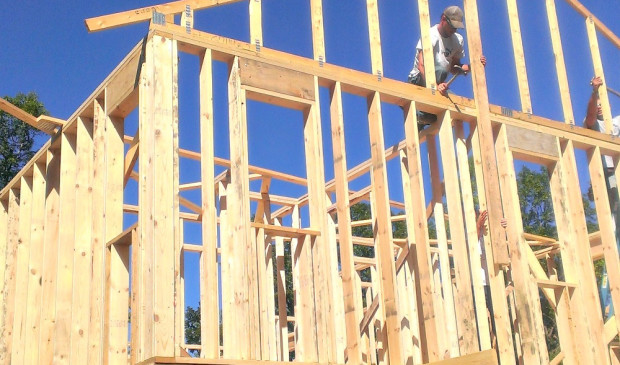RECA report on affordability blames city, neighbors
Thursday, August 13, 2015 by
Jo Clifton As the city struggles to provide development review services needed to ensure that its many regulations are being followed, the Real Estate Council of Austin reports that “Austin is steadily losing ground in its efforts to become a ‘beacon of sustainability, social equity, and economic opportunity’ as Imagine Austin envisioned. The necessities of life, especially housing, are less affordable and accessible to the majority of Austin residents than ever before.”
That’s the problem as laid out in a RECA white paper titled Affordable Austin: Why Can’t We Build the Supply We Need. The real estate group has eight recommendations for ameliorating the problem, starting with major policy changes it says are necessary to encourage more housing in a wider range of prices throughout the city.
In addition, RECA recommends that the city simplify and eliminate redundancies in city processes. For example, it says the site plan requirement for small projects on infill sites should be eliminated. According to one city staff member, the site plan process normally takes three to six months but can take as long as a year.
Walter Moreau, executive director of Foundation Communities, a nonprofit that builds affordable apartment units with federal funding, sees the city’s process as a big problem for developers trying to finish projects on a tight deadline. Moreau, who is quoted in the report, says, “All of our recent affordable apartments have been perilously close to losing federal funds because of timing deadlines. We had $11 million in federal funding at risk on Capital Studios, and we are currently racing to complete Homestead Oaks Apartments by a federal deadline. Despite best staff efforts and expedited SMART Housing reviews, the permit process has taken 10 months, which leaves very little time for construction without being at risk of finishing late. As a nonprofit we cannot afford to take this timing risk anymore to build new affordable housing.”
Heidi Gerbracht, RECA vice president of public policy, notes that “right now we have 10 departments that have responsibility for some level of review. Management could absolutely say – and this is in the Zucker Report – you affiliated departments will develop the standards by which Development Review will process and complete the reviews, so that the responsibility for meeting the time frame lies solely with” the Development Review Department. That would be in contrast with what happens now, she said; for example, the reviewer in the Fire Department will take the project, and the person responsible in the Development Review Department loses control over it.
RECA recommends investing more money for the Development Services Department and redefining success for members of that department. The group also wants to require that neighborhood plans either be updated and made consistent with Imagine Austin – in other words, allowing for more density – or repealed.
Like Imagine Austin, RECA calls for significantly denser development in the central city. But the density that RECA sees as necessary for encouraging a compact, connected and diverse city is exactly what Mary Ingle, president of the Austin Neighborhoods Council, does not want to see.
Ingle said Wednesday, “They’re bringing forward a false argument that increasing density equals affordability.” She cited a study done by the city in 2012 that she said indicated there were “enough entitlements on the ground right now to double our population. We haven’t used those entitlements. For example, in West Campus there’s enough entitlements for the next 75 years. … It’s all about RECA saying we want it, we need it. Basically they want our land, and they want it cheap – especially the central city.” Entitlements are approvals allowing a developer to build a specific type of development on a property.
Ingle may also be reacting to the section of the white paper that squarely places blame for the city’s lack of affordable housing on groups like the Austin Neighborhoods Council. “Austin’s dysfunctional code and development approval process were not created in a vacuum,” the report says. “They are the product of decades of effective lobbying among powerful constituencies determined to fight growth and change at every turn with antidevelopment policies that only worsen the very problems they seek to solve.”
According to RECA, skyrocketing home values, which result in higher and higher taxes, are caused by lack of development, not new development. RECA also points out that neighborhood groups may represent homeowners to the detriment of renters, who make up a majority of the city’s population. Additionally, it says, “neighborhood business interests are also rarely considered.”
As a result of disparate neighborhood plans, Austin has a patchwork of standards that are “difficult to enforce and a major obstacle to builders trying to lower costs through efficiencies of scale on missing middle (income) product throughout the city,” the report notes.
In addition to changing land use policies, RECA says, “We need to commit as a community to having the will to address challenges to affordability at every opportunity.”
RECA also recommends that the Council begin to listen to feedback through avenues other than citizen testimony, such as email, phone calls, texts and tweets.
For Ingle, however, “They (developers) want the whole urban core, and if people knew this, I think they’d be up in arms. … It’s just the greed factor. … Austin has the opportunity – we’re the capital of Texas – to set the bar. We could actually plan and design our city beautifully. … We’re in such a rush for density, density, density.
Photo by HomeSpot HQ made available through a Creative Commons 2.0 license.
You're a community leader
And we’re honored you look to us for serious, in-depth news. You know a strong community needs local and dedicated watchdog reporting. We’re here for you and that won’t change. Now will you take the powerful next step and support our nonprofit news organization?











